meet people
Learn about the real-world experiences of people living with TK2d, listen to their stories, and gain a better understanding of the impact of TK2d on their lives. Every patient is unique, and their individual experiences may vary. All of their stories are important.

Learn about the real-world experiences of people living with TK2d, listen to their stories, and gain a better understanding of the impact of TK2d on their lives. Every patient is unique, and their individual experiences may vary. All of their stories are important.
Small successes let us know that our best days may still be waiting for us in the future instead of fading away in the past. They give us a reason to keep going.
Yagmur: The journey to diagnosis
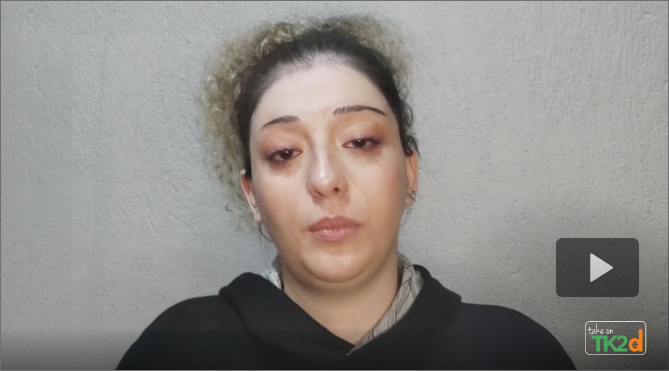
View transcript
Join Yagmur as she talks about her long journey to a TK2d diagnosis and what finally finding a name for the cause of her symptoms means to her. Listen to her story.
- Intro card: Meet Yagmur, who lives with thymidine kinase 2 deficiency (TK2d)
- Title card: Yagmur lives in Turkey with her parents. She is an advocate for people affected by TK2d.
- Yagmur: My name is Yagmur Kiris. I'm 27 years old. I live in Turkey. I'm diagnosed with TK2d.
- Title card: Recognizing TK2d
- Title card: A normal healthy baby
- Yagmur: When I was born, all test results and my appearance were like that of a normal, healthy baby. My mother didn't notice any abnormalities in my development until I was 1 year old, then she noticed I was getting support from my knees when I was trying to stand up. Following many examinations, tests, and analyses, I was diagnosed with mitochondrial myopathy at the age of 2. But we didn't know, for many years, that this was an incomplete diagnosis.
- Title card: Growing up with TK2d presented challenges
- Title card: Feeling excluded and having difficulty in expressing yourself was even harder
- Yagmur: Not being able to play with peers was hard enough for a 6-year-old child. But feeling excluded and having difficulty in expressing yourself was even harder.
- Title card: I had mild weakness until 15 years of age
- Yagmur: I had mild weakness until 15 years of age. Like difficulty in walking up the stairs and needing support when walking. But now I'm thinking what will happen in the future as the disease progresses.
- Title card: For Yagmur, a definitive diagnosis brought clarity
- Yagmur: For me to be diagnosed took exactly 21 years. I finally became acquainted with it in real terms as a result of my whole gene analysis.
- Title card: Things that were not understood before started to make sense.
- Yagmur: This was like learning the name of something that I know everything about. Things that were not understood before started to make sense. The reason why the diagnosis process took this long was probably lack of information about the symptoms of TK2d, and lack of information about the course of it.
- Title card: If it's not visible to the eye, it doesn't make an impact.
- Yagmur: Unfortunately, there is a longstanding prejudice towards rare diseases such as this one. If the signs aren't revealed through tests, or if it's not visible to the eye, it doesn't make an impact.
- Title card: together, we have the power to take on TK2d
Fanny and Luz: The Impact of TK2d
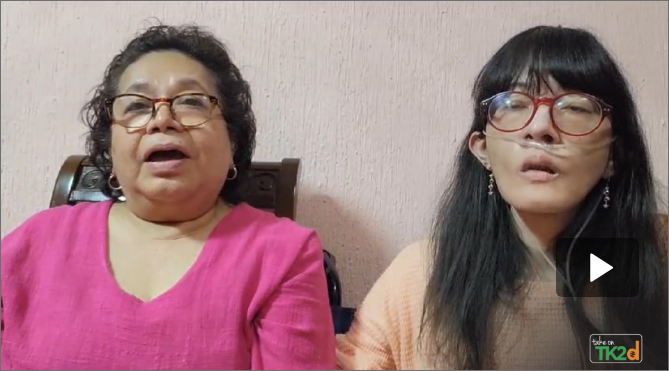
View transcript
Meet Fanny and Luz to learn how they take control of the future while managing the impact that TK2d has on their daily lives. Listen to their story.
-
- Intro card: Meet Fanny, who lives with thymidine kinase 2 deficiency (TK2d)
- Title card: Fanny communicates with an augmentative and alternative communication device due to TK2d symptoms.
- Title card: Fanny was diagnosed with TK2d at 27 years old
- Super: Thymidine kinase deficiency type 2 (TK2d) is a genetic mitochondrial disorder.
- Fanny: Hi. My name is Fanny, and I am 32 years old.
- Luz: Hello. My name is Luz Maria. I'm here with her because due to TK2d, she no longer has the ability to speak.
- Title card: Fanny's journey to diagnosis
- Luz: The first thing I did was take her to orthopedics to find out why she fell down so much. One orthopedist referred us to a doctor who actually specializes in muscular dystrophy. This doctor started to see her when she was 4 years old, and well, diagnosed her as having muscular dystrophy. All these years, we thought that was the illness she had. Then, this very same doctor said she no longer knew what illness it was.
- Title card: My instincts told me I didn't have a dystrophy
- Fanny: That's when I was referred to a neurologist, who worked with a geneticist, who wanted to order genetic testing for muscular dystrophy. My instincts told me I didn't have a dystrophy, so I declined and saw a different geneticist. He recommended whole-exome sequencing, which showed that I have TK2d.
- Title card: The impact of TK2d on Fanny and her family
- Title card: TK2d has isolated me
- Fanny: TK2d has isolated me in some ways. Little by little, I had to quit going to school and going out with friends.
- Luz: Well, I'm the one taking care of her. For me to go anywhere, I need to ask others for help.
- Title card: A normal day for Fanny and her mother
- Luz: A regular day for us is waking up, getting ready, washing up, making food, and above all, feeding Fanny because she can no longer eat, chew, and swallow. She has a feeding tube. This food is prescribed by hospital nutritionists. It's administered four times a day, every three hours.
- Title card: There's so much beauty in nature that life feels like a miracle.
- Fanny: Between meals, I try to get some rest or do some of my favorite activities, like reading, playing video games, or knitting. I also love to spend time outdoors, especially by the water. There's so much beauty in nature that life feels like a miracle. There's daily exercises I have to do too, and I often have appointments to attend.
- Title card: Looking forward
- Title card: I am motivated to use my voice to push for the care I need
- Fanny: I take control of my future by advocating for myself. With the love and support of my family, I am motivated to use my voice to push for the care I need, to raise awareness about mitochondrial diseases like TK2d, and to tell my story.
- Title card: together, we have the power to take on TK2d
Doreen: Daily life with TK2d
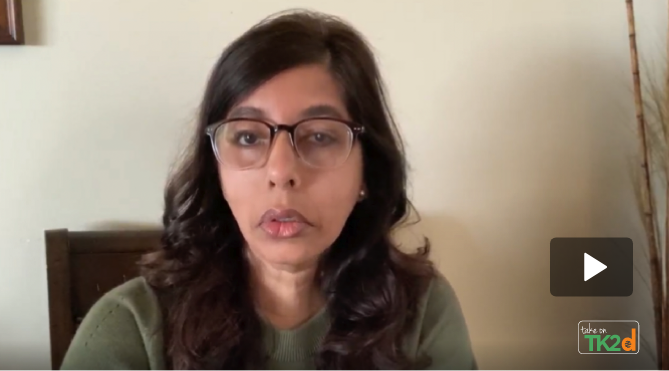
View transcript
Doreen shares the impact of TK2d on her life and her hopes for the future. Listen to her story.
- Intro card: Meet Doreen, who lives with thymidine kinase 2 deficiency (TK2d)
- Title card: Doreen lives in the US with her daughter and fiancé. She is an ambassador for the United Mitochondrial Disease Foundation and works to support others living with TK2d.
- Doreen: Hello. My name is Doreen, and I have TK2, which I was diagnosed with in 2015.
- On screen super: Thymidine kinase deficiency type 2 (TK2 or TK2d) is a genetic mitochondrial disease.
- Title card: Day-to-day life with TK2d for Doreen
- Doreen: When I was first diagnosed, although I had symptoms, I was able to do my normal activities. Today, I can't. Each day for me is different depending on my level of fatigue and weakness, but I find that each day I can do less and less. It can take up to an hour to eat, because my mouth and facial muscles are weak, making it harder to chew and swallow liquids or solid foods without choking. My symptoms have rapidly progressed in the last 3 years. What worries me most about my condition is that I'll be unable to eat and breathe on my own.
- Title card: The impact of TK2d on Doreen
- Doreen: TK2 has progressively taken away my physical strength, my ability to eat, swallow, and breathe. It's hard to form words and speak clearly because my mouth gets tired very easily. Also, I have weakness in my face, which makes it impossible for me to form a smile. It makes it hard to greet and interact with people because facial expressions are an important way people communicate. When you don't have the ability to smile, you are at a disadvantage. I used to have a job in the medical field that I loved, but the effects of TK2 have robbed me of my career. I'm no longer able to work or live alone but have become dependent upon my loved ones to help with my care.
- Title card: Doreen's hopes for the future
- Doreen: But I hope in the future, TK2 patients like myself live more fruitful lives. I also hope that one day I will be able to form a smile and speak without any difficulty.
- Title card: together, we have the power to take on TK2d
Connie: Misperceptions of TK2d
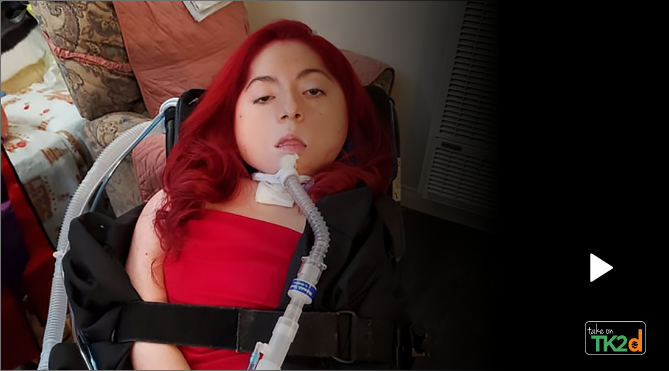
View transcript
Meet Connie and learn how writing has empowered her to reclaim her narrative and address society’s misperceptions about TK2d. Listen to her story.
- Intro card: Meet Connie, who lives with thymidine kinase 2 deficiency (TK2d)
- Title card: Connie communicates with an augmentative and alternative communication device due to TK2d symptoms.
- Title card: Connie is 27 years old
- Super: Thymidine kinase deficiency type 2 (TK2d) is a genetic mitochondrial disorder.
- Connie: Hi, my name is Connie Morales, and I have a mitochondrial disease known as TK2d. It is a primary mitochondrial myopathy, meaning that it causes muscle weakness. I am an aspiring author and freelance writer with a plan to self-publish a book one day.
- Title card: When I write, I am no longer an anomaly or restricted by the labels others give me.
- Connie: When I write, I am no longer an anomaly or restricted by the labels others give me.
- Title card: Instead, I'm empowered to reclaim my narrative by taking back autonomy over my hopes and needs.
- Connie: Instead, I'm empowered to reclaim my narrative by taking back autonomy over my hopes and needs.
- Title card: Writing will forever be my happy place.
- Connie: Writing will forever be my happy place.
- Title card: Being seen as a person, not a patient
- Title card: explaining TK2d to others
- Connie: When it comes to explaining TK2d to others, I can understand how it sounds a bit complex, especially if it's the first time they've ever heard of it.
- Title card: I usually try to connect it to something more relatable.
- Connie: I usually try to connect it to something more relatable.
- Title card: Sometimes I tell younger kids that I'm secretly a mermaid and that being out of water makes my body tired.
- Connie: Sometimes I tell younger kids that I'm secretly a mermaid and that being out of water makes my body tired.
- Title card: Not better, not worse, just different
- Connie: TK2d may make my body weaker at certain things, but all that means is that I need different types of support than others. Not better, not worse, just different. Some use a fork and spoon to eat, I use a feeding tube. Some use legs to get where they need to go, I use wheels. I have a ventilator which controls the pacing of my breathing, so I may not be able to speak as clearly or as quickly as I want. All that means is I need a little bit of patience. In fact, almost everyone catches on to my accent after a little while.
- Title card: Needing alternative forms of help doesn't take away my mind, feelings, wants, voice, free will, or the chance of a fulfilling life.
- Connie: Needing alternative forms of help doesn't take away my mind, feelings, wants, voice, free will, or the chance of a fulfilling life.
- Title card: society's perception of who I am versus who I actually am
- Connie: However, being able to exercise these things is largely dependent on the lens people perceive me through. The heaviest weight I bear is the incongruence that exists between society's perception of who I am versus who I actually am.
- Title card: mistaken as emotional numbness
- Connie: Due to muscle weakness, I'm very much lacking in the facial expression department, which is sometimes mistaken as emotional numbness. But this notion that I am a passive bystander with no goals, ambitions, or dreams is completely invalid. I have a strong sense of awareness and independence.
- Title card: I want the same things as many others
- Connie: I want the same things as many others. I hope to build a career I love, have opportunities to travel, explore, make friends, maybe find love, and raise a family one day.
- Title card: Connie's advice for others
- Title card: you are your own best advocate
- Connie: That being said, a key piece of advice I'd give to those navigating the maze that is primary mitochondrial myopathy is that you are your own best advocate. Never be afraid to speak up for what you know is best for you. While your medical team, family, friends, and other members of your support group have their hearts in the right place, they may not see beyond a fraction of what your everyday is like.
- Title card: Only you know what you need, and you deserve to be heard, so please, use your voice and make yourself known.
- Connie: Only you know what you need, and you deserve to be heard, so please, use your voice and make yourself known.
- Title card: A positive life and a positive impact
- Title card: Overall, I want to make a positive and lasting impact on the world.
- Connie: Overall, I want to make a positive and lasting impact on the world.
- Title card: While I may not have the smoothest path to reach these goals, I do have one, and I am here.
- Connie: While I may not have the smoothest path to reach these goals, I do have one, and I am here.
- Title card: together, we have the power to take on TK2d
Jared: Life beyond TK2d
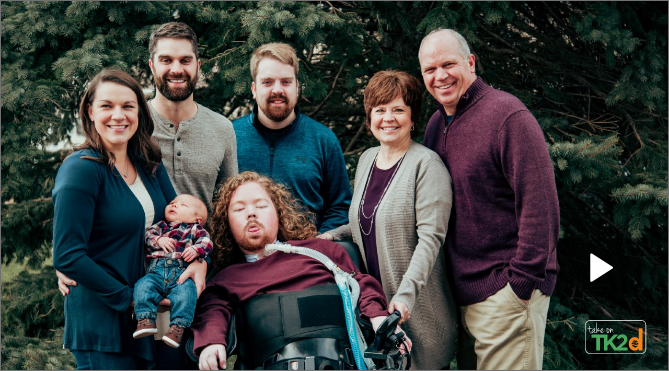
View transcript
Meet Jared, an aspiring science fiction writer with a masters in Quantum Mechanics, and hear how he navigates his life beyond TK2d. Listen to his story.
- Intro card: Meet Jared, who lives with thymidine kinase 2 deficiency (TK2d)
- Title card: Jared communicates with an augmentative and alternative communication device due to TK2d symptoms.
- Title card: Jared was diagnosed with TK2d when he was 2 and a half years old
- Super: Thymidine kinase deficiency type 2 (TK2d) is a genetic mitochondrial disorder.
- Jared: My name is Jared, and I am an aspiring science fiction writer. I live with TK2d, an ultra-rare mitochondrial disease. There are still a lot of things I want to do in my life, and my disability is an obstacle I work around. Sometimes I think that people forget that disabled people are full and complex human beings. Our disabilities are only part of our identities. We have the same fears and desires as anyone else. In school I studied and took exams and stressed about grades like anyone else. I had friends and secret crushes, and I played video games and went to prom. I debated on which college I should go to, and I had to maintain a high enough GPA to keep my scholarships. I got my Masters in Quantum Mechanics, and I wrote my thesis on Quantum Chaos. I chose that topic because I thought it was interesting, and I'm good at the math involved. I was best man at my brother's wedding, and I'm godfather to his son, Connor. I won't pretend my life is perfect, or that I don't face challenges and deal with mental health problems. Almost every problem I have - breathing, communicating, mobility, etc. - is a direct result of myopathy. My mobility issues are relatively easy to deal with, and I see a psychologist, but things become very difficult when you can't communicate and have difficulty breathing. Words can't describe how horrible it is when you try to take a breath and don't quite get enough air, and then it just gets worse with each passing day. I know my experience isn't unique. I have friends who have been living with TK2d since they were young, too. But for the most part, I'm glad to be alive.
- Title card: Jared's outlook
- Jared: Small successes can be life-changing for us. They let us know that our best days may still be waiting for us in the future instead of fading away in the past. They give us a reason to keep going.
- Title card: together, we have the power to take on TK2d
Sign up and stay informed
Register to stay on top of the latest developments and get updated about newsworthy milestones.*All fields are required.
In addition, all of our future communications will include an opportunity to opt out. WHO WE ARE Click here to learn more about UCB and our efforts to take on TK2d.


